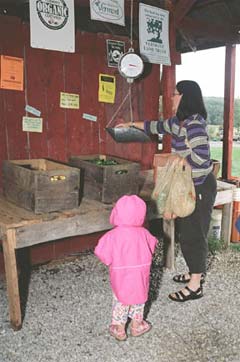Farming Goes Public: Community Supported AgricultureBy Lynn MontyPhoto: Margaret Michniewicz 
Members arrive to pick up their weekly share of vegetables and flowers at The Wellspring Farm. During the 1960s, a group of Japanese women concerned about the use of pesticides initiated a consumer movement to support local farmers, called teikei or “putting the farmer’s face on food.” Today, over one thousand thriving farms and their communities worldwide participate in Community Supported Agriculture (CSA), as it is known in the West. In a CSA, farmers produce farm products, usually vegetables, directly for local community members. The community members, in turn, agree to be shareholders in the farm by pledging money to cover the farm’s operating costs prior to the growing season. This supplies farmers with increased financial security and better prices for their crops. Community shareholders receive the pick of the crop all season long, but also share in the risk of crop failure and reduced yields due to unfavorable conditions. Most CSA farms are organic. CSAs were first introduced to the U.S. in the 1980s from Europe, where they had developed simultaneously with, but independent of, Japan’s initiative. Robyn Van En’s Indian Line Farm in South Egremont, Massachusetts was one of the first U.S. farms to promote the idea. Within four years, the number of consumers supporting her farm expanded from 30 to 150 members. Van En went from being a market gardener to a nationally recognized leader of the CSA movement, directly supporting more than 200 CSAs before she died in 1997. Currently Vermont has forty-two CSAs. They help ensure that farms continue to grow and prosper. As Mimi Arnstein of the Wellspring Farm in Marshfield says, “If you want the farms to stay, you have to buy from them. It’s that simple.” Wellspring Farm is in its third season as a CSA and has ninety members. Arnstein began as a volunteer on a CSA farm during graduate school seven years ago and discovered that she loved bringing people together with food, community, and care for the land. “I got hooked,” she says. As a woman farmer, Arnstein wishes she were a foot taller and a hundred pounds heavier to cope with the hard physical labor, but knows her hard work inspires. “There are a number of members who have told me that they’re excited to see a woman farmer, and that I am a good role model to expose their children to,” she says. She is also a role model for female apprentices, and is often sought out by them. Amanda Payne is her current apprentice. “I feel good about passing on skills like carpentry and how to use the equipment,” Arnstein says. “I don’t wake up every day and say, Wow, I am a farmer who is a woman, but I am proud to be a role model.” Sandiwood Farm in Wolcott has been a CSA for ten years. Owner Sara Schlosser, who holds a B.A. in environmental studies with a concentration in agriculture, had over fifty shareholders at one time. But she found she was spending more time in the washing and packing house than in any other area on the farm. She has since scaled down. “CSAs are a wonderful idea,” Schlosser says. “The concept is getting more known and taken to new levels. Farms can decide if they want to pre-bag, add eggs or a side of bread. I have even heard of CSA wood shares. It’s win-win all the way around.” A number of CSA farms urge shareholders to venture out into the fields and harvest their own produce. Though Sandiwood is not one of them, there have been many mornings when young mothers voluntarily teamed up to work while their children sorted and washed eggs. Older people often gather and trade recipes. “There is a diverse group of individuals who take an interest in this: families, business people, young and old. But they all have one goal – keeping Vermont green,” says Schlosser. Judy Stevens, owner of The Golden Russet Farm in Shoreham, calls her CSA a Farm-to-Kitchen-Connection. For more than twenty-one years, she has sought to provide her community with quality organic produce at a reasonable cost. Her farm has operated as a successful CSA for the past ten years with membership varying between 20 and 60. This season the farm has 47 regular members and 57 seniors through the Senior Farm Share Program. That program was brought to Stevens’ attention by the Northeast Organic Farming Association (NOFA), which offers low-income families and seniors a “farm to family” share. The Golden Russet Farm’s subscribers pay an annual fee prior to the growing season in return for fresh organic produce for eighteen weeks beginning in June. A Summer Share, for $315, provides enough produce to supplement a family’s weekly meals all summer long. A Fall Share ($130) provides fresh and storage produce from October to December. The Full Season Share ($430) combines summer and fall shares. “A lot of people haven’t had food production experience. This gives them a chance to go right to the farm and see how it works. People get a chance to get out and get their sneakers dirty and smell the roses,” Stevens says. These Vermont women continue to shape our thinking about agriculture, sustaining not only the vital cause of the Japanese and Massachussetts women who have gone before them, but a piece of Vermont’s agricultural future. Vermont woman Lynn Monty is a married mother of two and full-time St. Michael’s College Journalism Major.
|